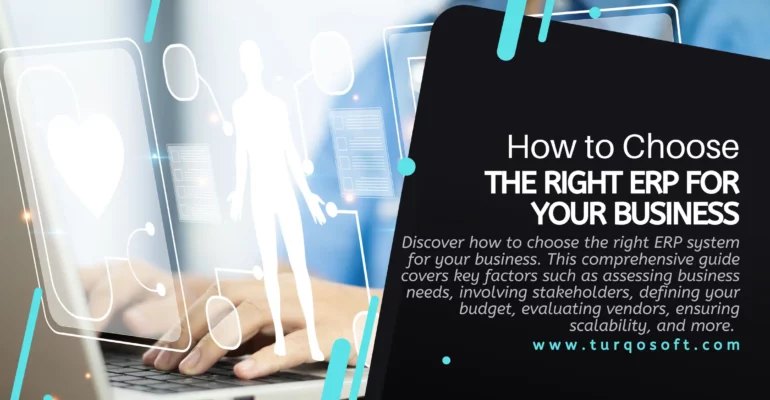How to Choose the Right ERP for Your Business

Choosing the right Enterprise Resource Planning (ERP) system for your business is a critical decision that can significantly impact your company’s efficiency, productivity, and growth. With numerous options available in the market, finding the perfect ERP can be daunting.

Choose the Right ERP for Your Business
This guide aims to simplify the process by highlighting key factors to consider and steps to follow in selecting the ideal ERP for your business.
1. Assess Your Business Needs
The first step in choosing the right ERP system is to understand your business requirements. Consider the following questions:
- What are the specific challenges your business is facing?
- Which processes need improvement?
- What are your long-term business goals?
Creating a detailed list of your needs will help you identify the features and functionalities required in an ERP system.
2. Involve Key Stakeholders
Involving key stakeholders from different departments in the decision-making process ensures that the selected ERP system meets the needs of the entire organization. Gather input from:
- Finance
- Operations
- Sales and Marketing
- Human Resources
- IT
Their insights will provide a comprehensive view of the requirements and potential challenges.
3. Define Your Budget
ERP systems vary significantly in cost. Establishing a budget early in the process will help narrow down your options. Consider not only the initial implementation costs but also ongoing expenses such as:
- Maintenance
- Support
- Training
- Upgrades
A clear budget will guide you towards solutions that are financially feasible for your business.
4. Evaluate Vendor Reputation and Support
Choosing a reputable ERP vendor is crucial for a successful implementation. Research potential vendors by:
- Reading customer reviews and testimonials
- Requesting case studies and references
- Assessing their experience in your industry
Additionally, evaluate the level of support they offer, including training, customer service, and technical assistance. A responsive and knowledgeable support team can make a significant difference in your ERP experience.
5. Consider Scalability and Flexibility
Your business is likely to grow and evolve over time. Therefore, it is essential to choose an ERP system that can scale with your business. Look for solutions that:
- Offer modular features that can be added as needed
- Support multi-site and multi-currency operations
- Provide flexibility to customize workflows and processes
Scalability and flexibility ensure that your ERP system remains relevant and effective as your business expands.
6. Assess Integration Capabilities
An ERP system should integrate seamlessly with your existing software and tools. Assess the integration capabilities by:
- Ensuring compatibility with your current systems (e.g., CRM, HRM, accounting software)
- Checking for APIs and other integration options
- Understanding the ease of data migration and synchronization
Smooth integration minimizes disruptions and enhances efficiency across your organization.
7. Request Demos and Trials
Seeing the ERP system in action is crucial before making a final decision. Request demos and trials from shortlisted vendors to:
- Evaluate the user interface and ease of use
- Test the functionalities and features
- Gather feedback from end-users
Hands-on experience with the system will provide valuable insights into its suitability for your business.
8. Plan for Implementation
Successful ERP implementation requires careful planning and execution. Work with your chosen vendor to:
- Develop a detailed implementation plan
- Set realistic timelines and milestones
- Allocate resources and responsibilities
Proper planning ensures a smooth transition and minimizes potential disruptions to your business operations.
Conclusion
Choosing the right ERP system for your business is a significant investment that requires careful consideration and planning. By assessing your needs, involving key stakeholders, defining your budget, evaluating vendor reputation, and ensuring scalability and integration capabilities, you can select an ERP system that drives efficiency, productivity, and growth. Take the time to research, test, and plan your implementation to ensure long-term success.
By following these steps, you can make an informed decision that aligns with your business goals and sets the stage for a successful ERP implementation. If you need further assistance or have any questions, feel free to reach out to our team of experts. We’re here to help you find the perfect ERP solution for your business!
Get in touch with us today! Whether you prefer to reach out via email at info@15.206.92.4 or give us a call at +91 9841205845, we’re here to help.
Alternatively, stay connected with us on various social media platforms including LinkedIn, YouTube, Facebook, Twitter, Pinterest, or Instagram. You’ll receive regular updates on ERP, CRM, HRMS and other relevant topics.
Don’t hesitate! Embrace the power of ERP solutions and witness your business soar to new heights!
Image Credit: Canva


